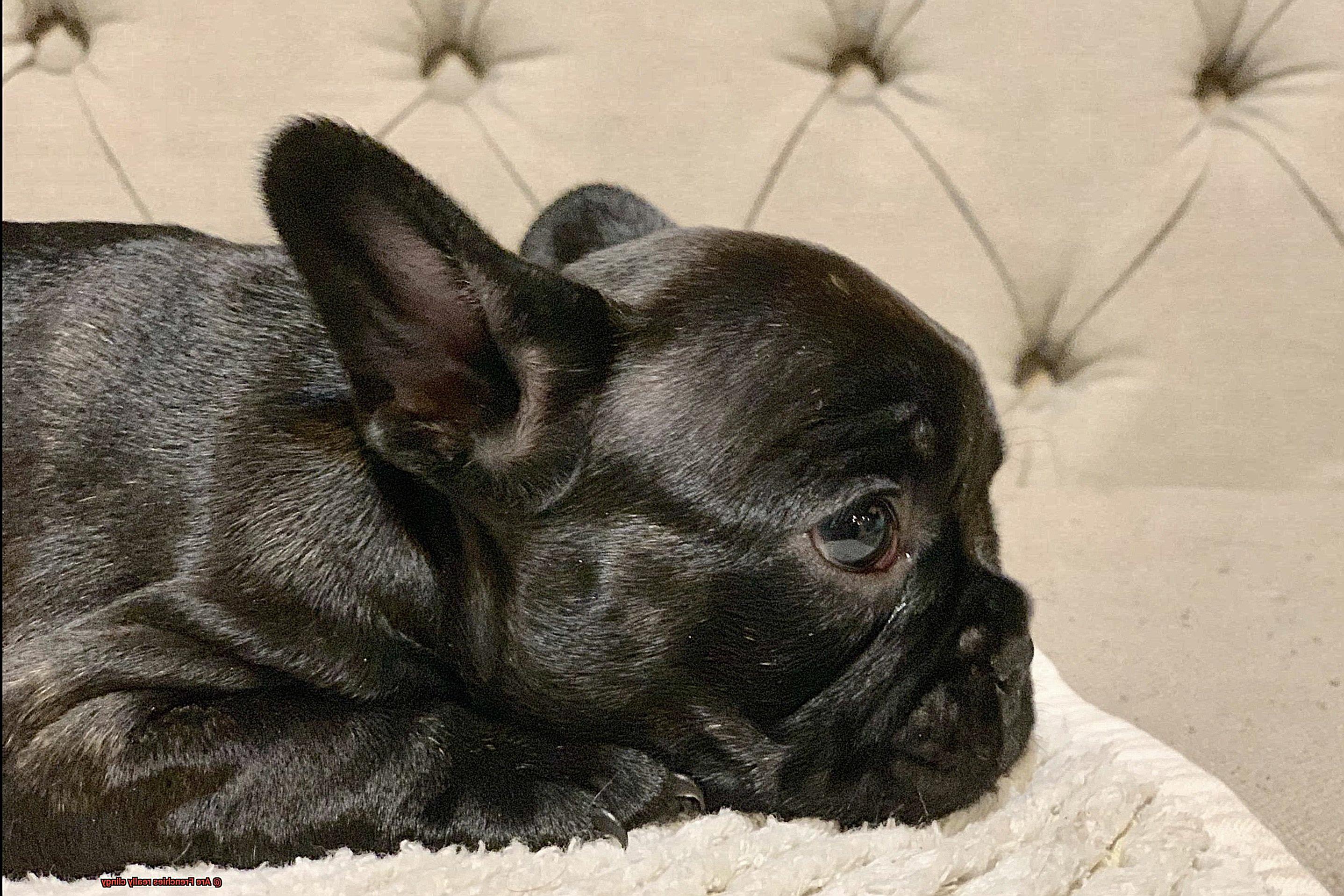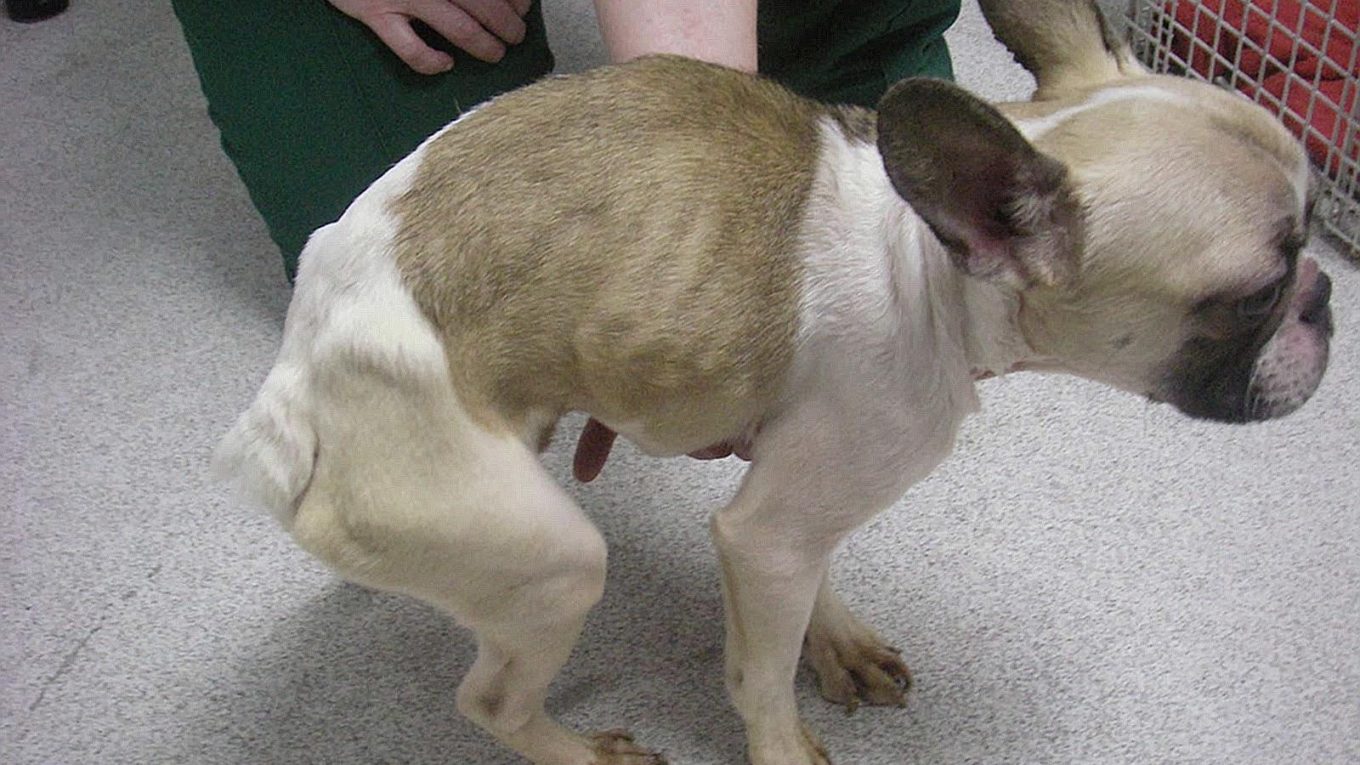Are Frenchies really clingy?
It’s a burning question that piques the curiosity of dog lovers and aspiring French Bulldog parents everywhere. I mean, just take one look at those adorable bat-like ears and expressive faces, and it’s no wonder these little cuties have become all the rage in recent years.
But here’s the thing – there’s this notion floating around that Frenchies can be a tad clingy. Is it true?
Get ready for some mind-blowing revelations about these lovable bulldogs.
Understanding the Nature of French Bulldogs
Contents
- 1 Understanding the Nature of French Bulldogs
- 2 The History of French Bulldogs as Companion Dogs
- 3 Differentiating Normal Affectionate Behavior from Separation Anxiety
- 4 Recognizing Signs of Separation Anxiety in French Bulldogs
- 5 Strategies to Overcome Clinginess or Separation Anxiety in Frenchies
- 6 Mental Stimulation and Physical Exercise for Redirecting Focus Away from Clinginess
- 7 Benefits of Crate Training for French Bulldogs
- 8 Seeking Professional Help for Persistent Issues
- 9 Conclusion
French Bulldogs, also affectionately known as Frenchies, are beloved pets known for their friendly and affectionate nature. One common trait that many French Bulldog owners notice is their tendency to be clingy. But is this clinginess really a characteristic of the breed? Let’s take a closer look at the nature of French Bulldogs to better understand why they may appear to be clingy.
Companion Breed: Lap Dogs at Heart

French Bulldogs were originally bred to be lap dogs, providing companionship and emotional support to their owners. This inherent need for human interaction and affection can contribute to their perceived clinginess. Frenchies thrive on attention and love being in close proximity to their owners. They are natural cuddlers and snugglers, finding comfort in being near their humans.
Loyalty and Attachment
French Bulldogs are known for their loyalty. They form strong bonds with their owners and seek constant reassurance and companionship. They are happiest when they are in the presence of their loved ones and can become anxious or distressed when left alone for extended periods of time. This attachment to their owners can sometimes be misinterpreted as clinginess.
Sociable Nature
Frenchies have a highly sociable nature. They are generally friendly towards other animals and humans, making them excellent companions in multi-pet households or families with children. However, this sociability can also contribute to their clingy behavior. French Bulldogs enjoy being part of the action and may follow their owners around the house, seeking attention and involvement in whatever activities are taking place.
Understanding Individual Differences
It is important to note that not all French Bulldogs exhibit clingy behavior to the same extent. Each dog has its own unique personality and temperament, which can influence its level of clinginess. Some Frenchies may be more independent and less inclined to seek constant attention, while others may display a stronger need for closeness with their owners.
Managing Clinginess
If you find that your French Bulldog’s clinginess is becoming problematic or overwhelming, there are strategies you can employ to help alleviate this behavior. Firstly, ensure that your Frenchie is receiving adequate physical and mental stimulation. Regular exercise, interactive playtime, and mental enrichment activities can help keep them occupied and fulfilled, reducing their need for constant attention.
Gradually teaching your French Bulldog to be comfortable with alone time can also help reduce clingy behavior. Start by leaving them alone for short periods of time and gradually increase the duration as they become more accustomed to being by themselves. Providing them with engaging toys or treats when you are away can also help distract and entertain them.
The History of French Bulldogs as Companion Dogs
Well, it all goes back to their fascinating history as companion dogs. In this blog post, we’ll dive into the origins of French Bulldogs, how they became beloved companions, and how their history has influenced their behavior and temperament.
From England to France: A Journey of Transformation
- French Bulldogs originated in England in the 1800s as small-sized bulldogs.
- Lace workers migrating to France during the Industrial Revolution brought these miniature bulldogs with them.
- The breed gradually evolved into what we now know as French Bulldogs.
French Bulldogs: The Darling of Paris
- French Bulldogs quickly gained popularity in France, particularly in Paris.
- Embraced by artists and bohemians, they became fashionable companion dogs.
- Seen alongside well-known figures of the time, they became a symbol of affluence and style.
The Ups and Downs: Wars and Revival
- World Wars I and II took a toll on the popularity of French Bulldogs due to economic difficulties and breeding challenges.
- After World War II, dedicated breeders worked to revive the breed and preserve its characteristics.
The Modern-Day Frenchie: A Clingy Companion
- French Bulldogs are now one of the most popular dog breeds globally.
- Their friendly and affectionate nature makes them excellent companion dogs.
- Their clinginess is a result of their history as loyal and affectionate lap dogs.
Understanding Clinginess: Separation Anxiety and Training Tips
- French Bulldogs may develop separation anxiety when left alone for extended periods.
- Gradual training and providing mental stimulation can help them become more independent.
- Short walks and indoor playtime, combined with ample attention and affection, keep them content.
Differentiating Normal Affectionate Behavior from Separation Anxiety
French Bulldogs, or as we like to call them, Frenchie cuddlebugs, are known for their irresistible charm and affectionate nature. These lovable lap dogs have a knack for showering their owners with love and attention. But how do we differentiate their normal affectionate behavior from separation anxiety? Let’s dig in.
Normal Affectionate Behavior:
When it comes to normal affectionate behavior, Frenchies take the crown. They are masters of melting hearts with their snuggles and cuddles. Here are some telltale signs of their normal, lovey-dovey ways:

- Cuddling Connoisseurs: French Bulldogs excel in the art of cuddling. They will happily curl up next to you on the couch or even hop into your lap for a cozy snuggle session.
- Lean Machines: These furry friends are experts at leaning against their favorite humans. It’s their way of seeking physical contact and showing their undying love.
- Lap Lovers: If you find your Frenchie resting their adorable little head on your lap, consider yourself blessed. This is a clear sign that they feel safe, comfortable, and content in your presence.
Separation Anxiety:
Separation anxiety can be a challenge for both Frenchies and their owners. This condition occurs when your furry friend becomes excessively distressed when separated from you or left alone. Here’s how to spot separation anxiety in French Bulldogs:
- Excessive Vocalization: If your Frenchie starts barking or howling excessively as soon as you leave, it could be a sign of separation anxiety. They’re basically saying, “Where are you going? Don’t leave me.”
- Destructive Behavior: Does your Frenchie turn into a little tornado when left alone? Chewing furniture, digging up carpets, or shredding pillows may be signs of separation anxiety. They’re expressing their stress and trying to cope with your absence.
- Indoor Accidents: French Bulldogs with separation anxiety may forget their potty training when left alone. If you come home to unexpected surprises, it could be a result of their anxiety.
Differentiating the Two:
Now that we’ve covered the basics, let’s distinguish between normal affectionate behavior and separation anxiety in French Bulldogs:
- Context and Frequency: Normal affectionate behavior occurs regularly, even when you’re present. Separation anxiety is triggered by your departure or the anticipation of being left alone.
- Duration and Severity: Normal affectionate behavior is mild and doesn’t cause significant distress. Separation anxiety can be intense and may disrupt your Frenchie’s daily life, affecting their eating, sleeping, and overall well-being.
Recognizing Signs of Separation Anxiety in French Bulldogs
French Bulldogs, or as I like to call them, Frenchie cuddlebugs, are known for their affectionate and loyal nature. They have a natural predisposition for being attached to their owners, which can sometimes lead to separation anxiety. If you have a Frenchie and suspect they may be struggling with separation anxiety, it’s important to recognize the signs and provide the necessary support and care.
So, how do you know if your Frenchie is experiencing separation anxiety? Well, let me break it down for you:
Behavioral Signs:
- Excessive barking: Is your Frenchie barking non-stop when you’re not around? This could be a sign of separation anxiety.
- Destructive behavior: Are your favorite shoes or furniture becoming casualties of your Frenchie’s anxiety? This destructive behavior can be a cry for help.
- House soiling: Accidents happen, but if your Frenchie is consistently having indoor accidents when left alone, it may be due to separation anxiety.
- Pacing: Does your Frenchie constantly pace back and forth when you’re not there? This restless behavior can indicate separation anxiety.
- Drooling: Excessive drooling can also be a sign of anxiety in French Bulldogs.
Physical Symptoms:
- Loss of appetite: If your Frenchie is refusing to eat when you’re away, it could be a sign of separation anxiety.
- Vomiting and diarrhea: Stress and anxiety can upset your Frenchie’s tummy, leading to vomiting or diarrhea.
Now that we’ve identified the signs, what can you do as a responsible Frenchie owner? Well, here are some tips:
Consult a Professional:
Create a Comforting Environment:
- Provide engaging toys for your Frenchie to keep them occupied while you’re away.
- Leave soothing music or white noise on to create a calming atmosphere.
- Consider using calming aids such as pheromone diffusers or compression shirts to help reduce anxiety.
Consistency and Gradual Desensitization:
- Gradually increase the time spent apart from your Frenchie, rewarding calm behavior.
- Be patient and understanding during the process, as overcoming separation anxiety takes time and effort.
Strategies to Overcome Clinginess or Separation Anxiety in Frenchies
French Bulldogs are known for their affectionate and clingy nature, which can sometimes lead to separation anxiety when they are left alone. Dealing with a clingy Frenchie can be challenging, but with the right strategies, you can help your pup feel more secure and confident when you’re not around.
In this guide, we will explore effective strategies to manage clinginess and separation anxiety in French Bulldogs.
Gradual Desensitization:
Gradually desensitizing your Frenchie to being alone is an important step in overcoming separation anxiety. Start by leaving them alone for short periods and gradually increase the duration over time. This helps them build confidence and understand that being alone is not something to be feared.
Create a Positive Association:
Make being alone a positive experience for your Frenchie by providing interactive toys or treats that keep them engaged and distracted. This helps shift their focus away from your absence and creates a positive association with being alone.
Establish a Consistent Routine:
Creating a consistent routine for your Frenchie can help alleviate anxiety. Set specific times for feeding, exercise, and playtime, as this gives them a sense of predictability and security. A structured routine helps them feel more at ease when you are not around.
Provide Physical and Mental Stimulation:
Ensuring your Frenchie gets plenty of physical and mental stimulation is crucial in preventing clinginess and separation anxiety. Regular exercise, interactive play, and puzzle toys keep their minds occupied and tire them out, reducing their anxiety levels.
Crate Training:
Crate training can provide a safe space for your Frenchie when left alone. Introduce the crate gradually, making it a positive experience with treats and praise. A crate serves as their den, making them feel secure and less anxious.
Gradual Departures and Arrivals:
Avoid making a big fuss when leaving or arriving home, as this can reinforce your Frenchie’s anxiety. Practice gradual departures and arrivals to reduce stress. Act calm and nonchalant, and your Frenchie will learn that your absence or presence is not a cause for concern.
Seek Professional Help:
If your Frenchie’s clinginess or separation anxiety persists despite your efforts, consider seeking professional help. Consulting with a veterinarian or certified dog behaviorist can provide additional guidance and support. They may recommend specific training techniques or even medication in severe cases.
Mental Stimulation and Physical Exercise for Redirecting Focus Away from Clinginess
Redirecting Focus Away from Clinginess: Mental Stimulation, Physical Exercise, and Training
French Bulldogs are known for their strong bonds with their owners, often exhibiting clingy behavior. While this can be endearing, it can also become a challenge when you need to focus on other tasks or when your Frenchie becomes anxious when left alone. In this section, we will explore the power of mental stimulation, physical exercise, and consistent training in redirecting your Frenchie’s focus away from clinginess.
Mental Stimulation: Engaging the Mind
Frenchies are intelligent dogs that thrive on mental challenges. By providing them with activities that engage their minds, you can prevent them from becoming overly dependent on you for entertainment. Puzzle toys, interactive games, and training exercises are excellent ways to keep their brains busy. Not only will this help redirect their focus away from clinginess, but it will also provide them with a sense of accomplishment and mental satisfaction.
Physical Exercise: Release the Energy
Regular physical exercise is not only crucial for keeping your Frenchie physically fit but also for releasing pent-up energy and reducing anxiety. Taking your Frenchie for daily walks, playing fetch, or engaging in other physical activities can help redirect their focus away from clinginess. It provides a healthy outlet for their energy and promotes overall well-being.
Training: Establishing Boundaries
Training is a powerful tool in redirecting your Frenchie’s focus away from clinginess. Teaching them basic obedience commands such as sit, stay, and leave it can help establish boundaries and reinforce independence. Positive reinforcement, such as treats or praise, when they display desired behaviors encourages them to engage in activities that do not involve clinging to you.
Consistency is Key
To effectively redirect your Frenchie’s focus away from clinginess, mental stimulation, physical exercise, and training should be consistent parts of their routine. Incorporate interactive toys, training sessions, and physical activities into their day to keep them engaged and occupied. This will prevent boredom and reduce the likelihood of clingy behavior.
Addressing Underlying Issues
It is important to note that if clinginess persists despite these efforts, there may be underlying separation anxiety or attachment issues. In such cases, it is recommended to consult with a professional dog trainer or a veterinarian experienced in behavior modification. They can provide further guidance and support in addressing these issues.
Benefits of Crate Training for French Bulldogs
In this article, we’ll explore the paw-some benefits of crate training your French Bulldog and how it can enhance their overall well-being. So grab a treat, sit back, and let’s dive into the world of crate training.
Independence and Security:
Frenchies are known for their clinginess, but crate training can help teach them independence and create a sense of security. By providing them with a designated space of their own, you’re giving them a retreat where they can feel safe and secure.
Housebreaking Made Easy:
Accidents happen, especially with French Bulldogs who are still mastering their potty habits. However, crate training can assist in housebreaking by limiting your Frenchie’s access to the rest of the house. This encourages bladder control and establishes a routine for bathroom breaks.
Rest and Relaxation:
French Bulldogs are prone to overheating due to their short noses. By crate training them, you’re offering a cool and comfortable spot where they can relax without the risk of overheating. It also provides them with a peaceful space away from distractions or potential dangers.
Bye-Bye Destructive Behavior:

Chewed shoes? Shredded furniture? Crate training can come to the rescue. When left unsupervised, Frenchies may engage in destructive behavior out of boredom or anxiety. By confining them to a crate with appropriate toys and chew items, you can redirect their energy and prevent these naughty habits.
Traveling Made Easy:
Planning a trip? With a crate-trained Frenchie, traveling becomes a breeze. Whether it’s a car ride or a long flight, having a familiar crate provides comfort and stability in unfamiliar environments. It reduces travel anxiety for both your furry friend and you.
Safety First:
Crate training ensures the safety of your French Bulldog. It prevents access to hazardous areas or substances in the house, such as the kitchen, where toxic substances may be present. Additionally, in emergency situations or unfamiliar places, having a crate-trained Frenchie allows for easy confinement and control.
Seeking Professional Help for Persistent Issues
Dealing with clinginess in French Bulldogs can be a challenge for many dog owners. While some may try various methods and techniques to address the issue, persistent clinginess may require the expertise of a professional. Here’s why seeking professional help is important when dealing with clinginess in French Bulldogs:
- Expert Assessment: A professional dog trainer or a veterinary behaviorist can assess the situation and identify the underlying causes of clinginess. They have the knowledge and experience to determine if the clinginess is due to separation anxiety, lack of socialization, or other behavioral issues.
- Customized Solutions: Professionals can develop a customized plan to address the clinginess based on your individual dog’s needs. They may use positive reinforcement techniques, behavior modification exercises, or recommend specific training programs to help alleviate clinginess.
- Accurate Information: Seeking professional help ensures that you receive accurate information about how to address the issue. There is a lot of misinformation available online, and consulting a professional can help you separate fact from fiction.
- Ongoing Support: Professionals can provide ongoing support and guidance throughout the training process. They can help you navigate any challenges that may arise and make adjustments to the training plan as needed.
- Patience and Consistency: Addressing clinginess in French Bulldogs is a process that requires patience, consistency, and ongoing effort. Professionals can help you stay on track and provide motivation when things get tough.
Remember, seeking professional help for persistent issues is not a sign of failure as a dog owner. It shows that you are committed to providing the best care for your French Bulldog and are willing to seek expert guidance when needed. With the right professional help and your dedication, you can effectively manage and reduce clinginess in your beloved French Bulldog.
Conclusion
In conclusion, it is clear that Frenchies are indeed a clingy breed.
They have an innate desire for constant companionship and thrive on being close to their owners. Their affectionate nature and loyalty make them the perfect cuddle buddies, always eager to snuggle up and be by your side.
Whether you’re watching TV or simply sitting at your desk, you can expect your Frenchie to be right there with you, providing warmth and comfort. This clinginess may sometimes be overwhelming for some individuals who prefer more independent pets.
However, for those seeking a furry friend who will shower them with love and attention, Frenchies are the perfect choice.




